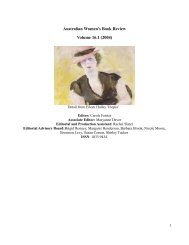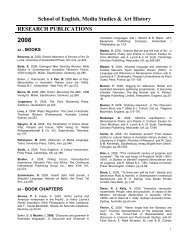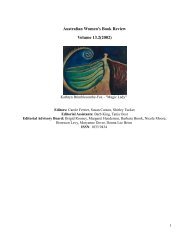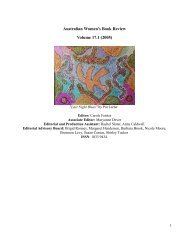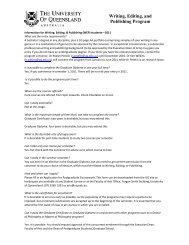Australian Women's Book Review Volume 14.1 - School of English ...
Australian Women's Book Review Volume 14.1 - School of English ...
Australian Women's Book Review Volume 14.1 - School of English ...
Create successful ePaper yourself
Turn your PDF publications into a flip-book with our unique Google optimized e-Paper software.
creation is music; specifically. evocative music that helps her awaken emotion and bridge the strings <strong>of</strong><br />
poetry and prose. In Hewett, theatre, music and poetry merge and bring about a sense <strong>of</strong> nostalgia and a<br />
desire to recreate the past. In talking about what the French call la mode rétiro, that is retrospective<br />
styling or a nostalgic mode in art, Fredric Jameson acknowledges that pastiche and parody are the most<br />
significant features or practices <strong>of</strong> postmodernism. He argues, however, that in what he calls new<br />
postmodernism, parody is excluded since 'modern art and modernism ... actually anticipated social<br />
developments' along the same lines. Since those developments involve social fragmentation and the<br />
emergence <strong>of</strong> numerous 'private languages' or, rather, registers associated with certain pr<strong>of</strong>essions, the<br />
linguistic norm becomes impossible and - by extension - so does ridicule. And indeed, Hewett's sense<br />
<strong>of</strong> humour is never employed in the service <strong>of</strong> mere parody. For the version <strong>of</strong> pastiche she now<br />
exploits is a syncretic mimicry <strong>of</strong> her own former dramaturgical styles as much as an author's discourse<br />
with her cultural heritage. Thus, in Nowhere, 'all the old favourites' are played during the metatheatrical<br />
moments in the plot, bringing back the recollection <strong>of</strong> The Golden Oldies, Hewett's earlier<br />
work commissioned for the launching season <strong>of</strong> the Playbox, Melbourne. Intertextuality, including that<br />
<strong>of</strong> modern art and social developments, is arguably why Hewett also keeps situating her plots on the<br />
edge <strong>of</strong> a small fictional town in Australia: it allows her to efface the contemporary reference, and<br />
encourages the public to receive her plays as Jameson puts it as narratives 'set in some indefinable<br />
nostalgic past, an eternal [2000s], say, beyond history.' They uphold mass-culture values and are about<br />
specific generational moments <strong>of</strong> the past. This stylistic option also explains why the language <strong>of</strong><br />
Hewett's plays nurturing the Shakespearean tradition, from The Man from Mukinupin to Nowhere, is<br />
somewhat archaic and evocative. Like parody, pastiche requires a dramatist to wear 'a stylistic mask'<br />
and reproduce 'speech in a dead language'. And yet Hewett's idiom is her own invention: it produces an<br />
idiosyncratic and highly personal language <strong>of</strong> dramaturgy that accommodates poetry and political<br />
awareness as an expression <strong>of</strong> 'the inner truth <strong>of</strong> that newly emergent social order <strong>of</strong> late capitalism'<br />
peculiar to Jameson's new postmodernism.<br />
The nostalgia mode serves Hewett one more purpose: to invoke the spirit <strong>of</strong> melodrama at various<br />
points in Nowhere. These excursions began far back in the 1970s during the author's expressionist stint,<br />
and can be detected in most <strong>of</strong> her plays. They were founded right from the start on an amalgam <strong>of</strong><br />
German and British notions <strong>of</strong> the genre since, in German theatre, the term melodrama is commonly<br />
associated with a 'musical-dramatic hybrid' ('musikalishe-dramatischen Mischform') or with a<br />
sensational form <strong>of</strong> popular entertainment. It was Eric Russell Bentley, Peter Brooks, and more recently<br />
Richard Murphy, who labelled the heightened emotional states in melodrama as 'hysterical' and<br />
introduced the argument that melodrama's 'deeper significance lies in the fact that it resorts to such<br />
“screaming” only in order to reach beyond dominant representational systems, codes and conventions,<br />
and beyond the epistemological and discursive restrictions associated with them.' The first big<br />
melodramatic outburst in Nowhere comes about when old Josh starts telling young Vonnie about his<br />
past, and the memory <strong>of</strong> the only woman he has ever loved brings back the image <strong>of</strong> his days as a<br />
Communist as well. Josh's mind is the repository <strong>of</strong> his identity and it remains, like Hewett's, solid and<br />
unshakable. The author thereby initiates a form <strong>of</strong> counter-discourse with her own past and the value<br />
system that was the focus <strong>of</strong> her social and political discontent. By interspersing the play with<br />
melodramatic utterances, she 'breaks through everything that constitutes the 'reality principle', all its<br />
censorships, accommodations, tonings-down'<br />
, She examines even her own convictions. Lines such<br />
as: 'Class is a 'ard thing to overcome ... No, that'd never work out', suggest a 'sobering-up' and the<br />
fading <strong>of</strong> Hewett's former ideals only to be revived several pages onwards in visionary statements like,<br />
'Socialism with a human face. That's what I've always believed in, Edith.' What the playwright sets<br />
about to undermine henceforth are assumptions encouraged by realism that 'grasping' reality<br />
39



